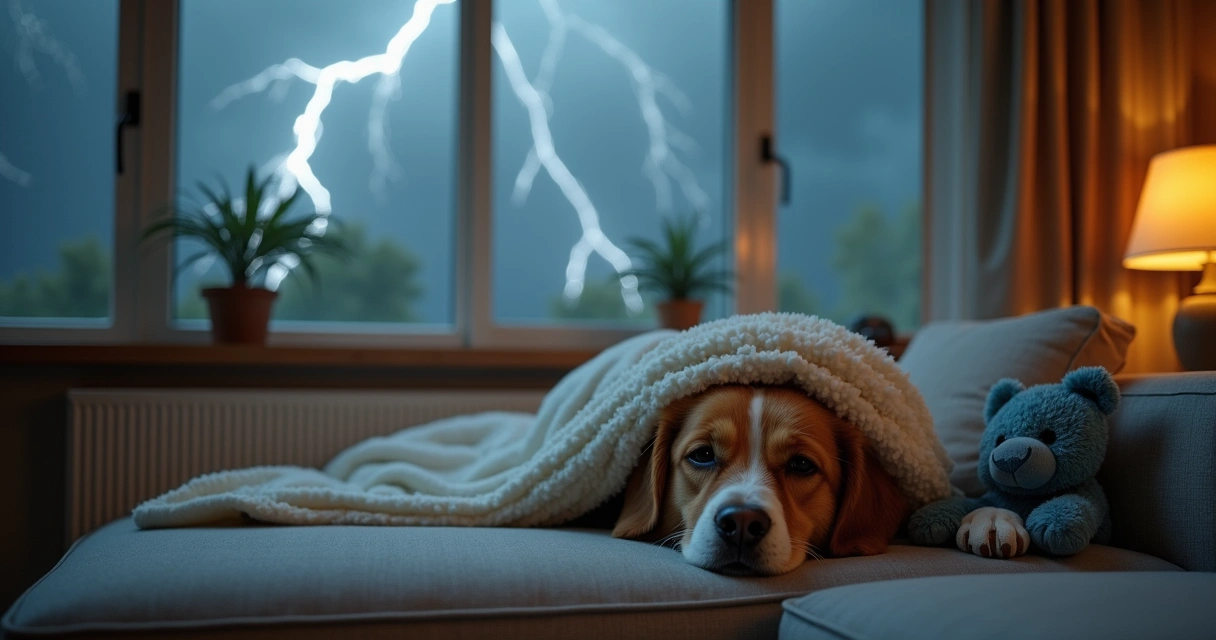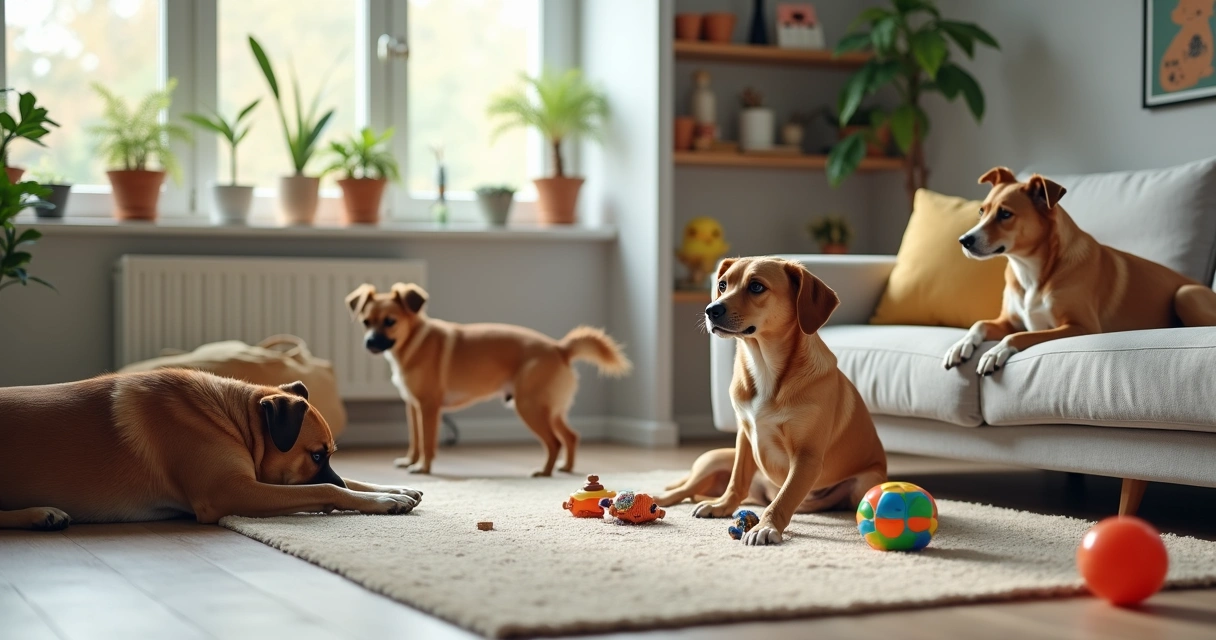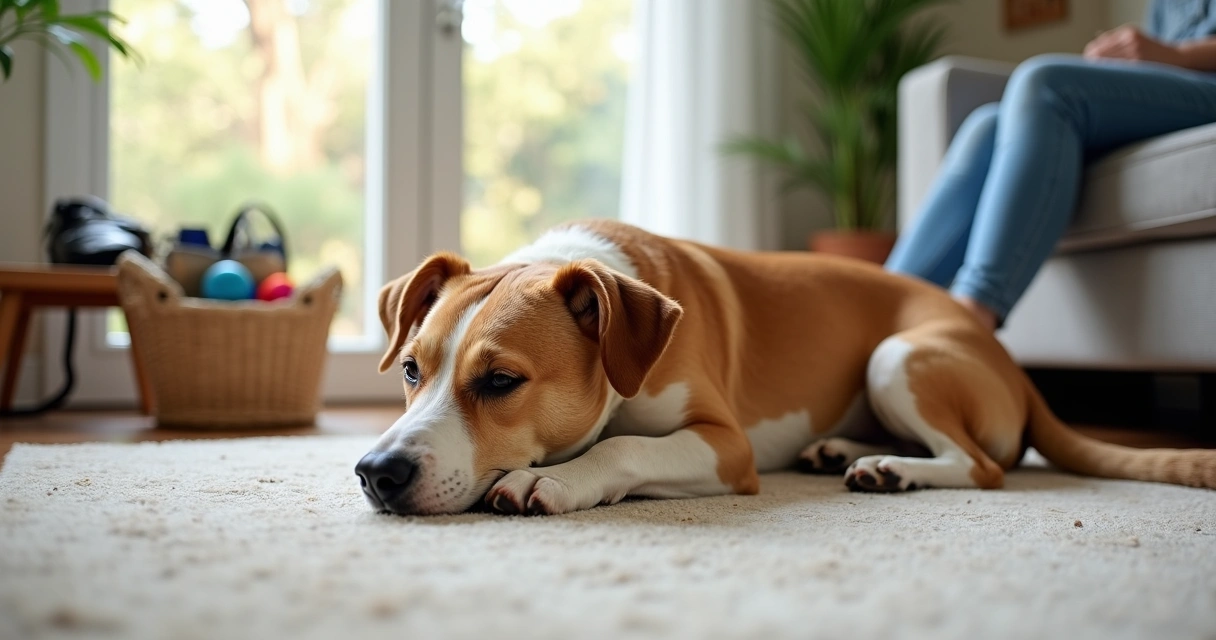Thunder rattles the windows. Lightning flashes. Some dogs barely raise an eyebrow, but others – trembling, hiding, even howling – find storms terrifying.
If this sounds familiar, you’re not alone. Many dogs struggle when the weather turns. But there are ways to help, even before the sky grows dark.
Understanding why dogs fear thunderstorms
Dogs have sensitive hearing, and their experience of a thunderstorm is much more intense than ours. The noise, flashes of lightning, changes in barometric pressure, and electric charges in the air can all feel overwhelming to a dog.
Dogs live in the moment. Storms make that moment confusing.
Each animal is different – some react with mild unease, others with full-blown panic. If you’ve ever watched your dog pace, pant, dig, or try to squeeze behind furniture as rain lashes the house, you know how real this fear can be.
Signs your dog may be anxious during storms
- Shaking or trembling
- Hiding under beds or in closets
- Pacing or restlessness
- Whining, barking, or howling
- Panting more than usual
- Attempts to escape or destructive behavior
- Loss of bladder or bowel control in extreme cases
Not every dog does all of these things, but even one or two can signal distress. At Dogtown, our experienced staff frequently receives questions about how to support pets through stormy weather. We believe preparation matters.
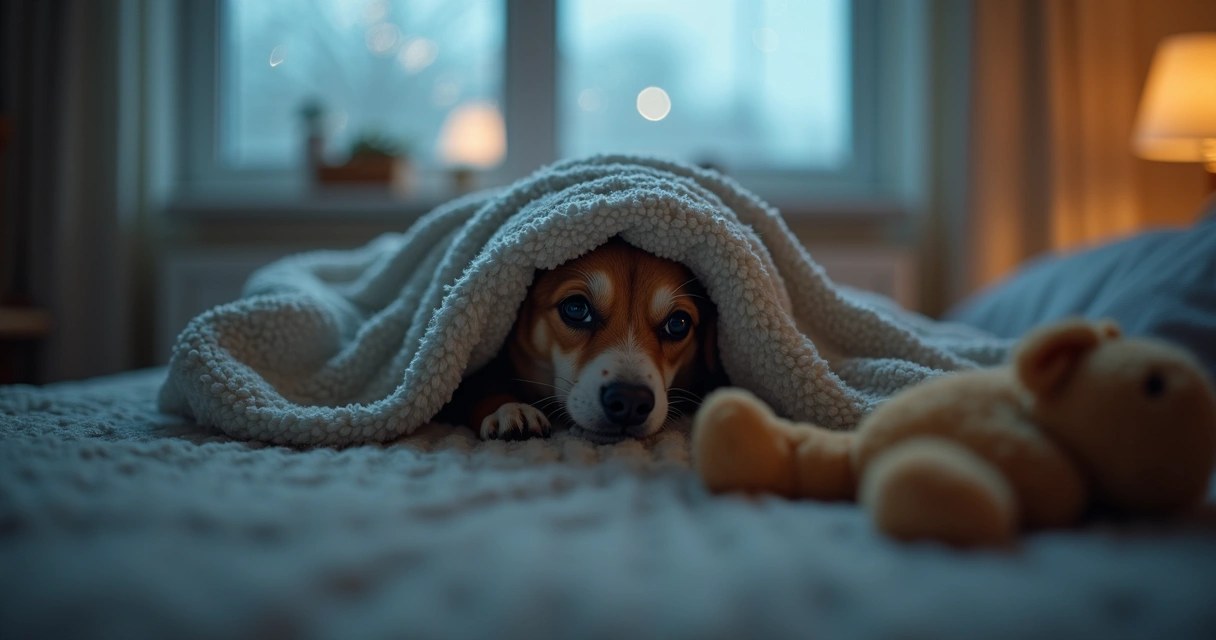
Before the storm: what you can do to prepare
Advanced planning goes a long way. As suggested by the Oregon Department of Agriculture, having a pet emergency kit – with food, water, and necessary medications – is smart for storms and other events. But when it comes to emotional storms, your preparations make just as much difference.
- Provide a safe place. Before bad weather starts, set up a quiet, enclosed space where your dog feels comfortable. This might be a crate, a closet, or even a bathroom.
- Make sure your dog is indoors early. As skies darken, bring animals inside so they can settle before the storms begin. This provides a sense of routine and safety.
- Have familiar items available. Favorite toys, blankets, and beds help your dog feel secure.
- Mute the madness. White-noise machines, fans, or the hum of the TV can help mask sudden loud noises.
- Keep yourself calm. Dogs are sensitive to your mood; your calm presence can act as their anchor.
During the thunder: step-by-step calming tips
Not every solution fits every dog. But there’s a toolkit you can try, just as we do with new arrivals at Dogtown. The City of San Antonio suggests staying up to date with weather, providing safe spaces, and rewarding calm behavior. Let’s look at what really works:
Create a safe retreat
If your dog heads to a certain spot before every storm, respect that choice. Often, a crate or small room with a comfy bed becomes their “storm bunker.” Add blankets and a beloved toy. Dim the lights. A retreat offers more comfort than you might think.
Mask storm sounds
Turn on background noise: soft music, a fan, or the TV at moderate volume. Classical or talk radio can help keep your dog distracted from thunder outside.
Stay present and positive
Your dog may look to you for reassurance. Sit nearby. Speak softly, offering calm pets or gentle brushing if your dog likes it.
Your presence is powerful.
Try distractions and activities
If your dog’s anxiety isn’t severe, sometimes a favorite game (tug, fetch, or learning simple tricks) can help. Offer tasty treats or a puzzle toy to focus your dog on something enjoyable, not the chaos outside.
Use compression garments
Some dogs find comfort from gentle pressure. Products like wraps or dog “shirts” can sometimes offer relief. If you try this, make sure it fits snugly but not too tight, and introduce it when your dog is calm.
Don’t scold, don’t fuss too much
Avoid punishing your dog for fearful behavior. But surprisingly, over-coddling can reinforce the fear as well. Offer consistent, calm support without making storms feel like a big event.
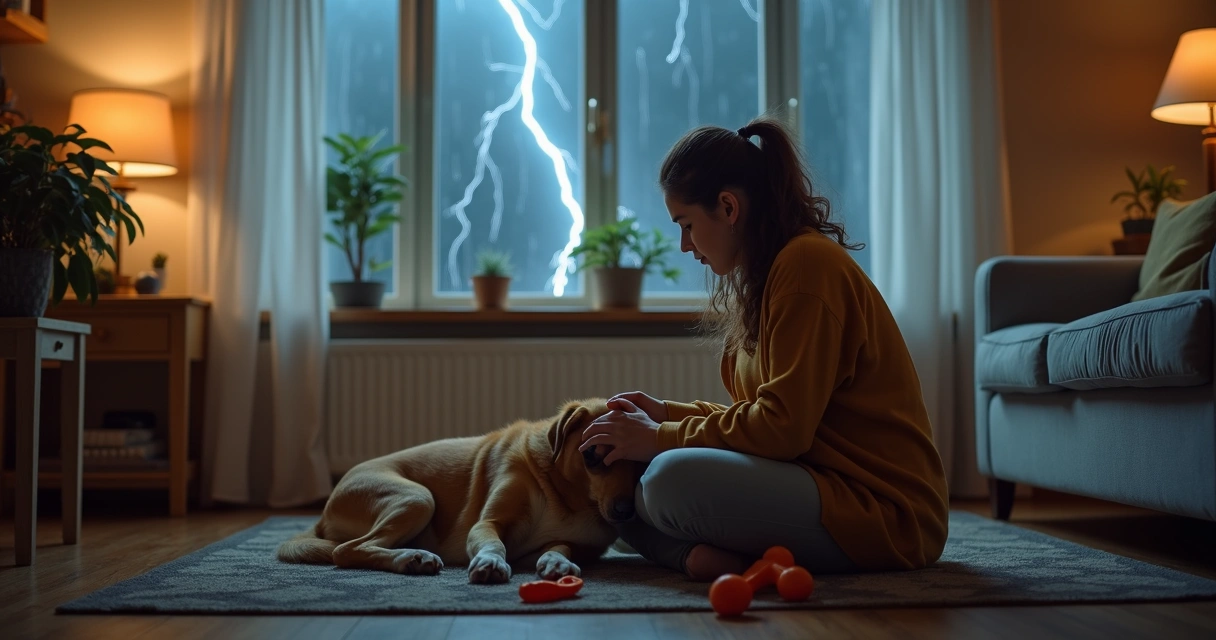
Extra support for severe anxiety
If your dog’s storm fears are severe – if they injure themselves or can’t recover after storms pass – it’s wise to seek professional help. Trained behaviorists or veterinarians can recommend treatment options, including medications or special therapy. For ongoing support, a facility like Dogtown’s training programs or personalized day camp can be helpful for socialization and behavior work.
Consider gradual desensitization
Training your dog with gentle exposure to storm sounds (recordings at a low volume, paired with treats and fun) over weeks or months can reduce their fear response. Just go slowly, stopping if your dog becomes overwhelmed. Some see improvement; for others, it’s just a little progress at a time.
Caring for dogs after the storm
Once the thunder fades, breathe out. But – don’t let your guard down just yet. Animal safety experts suggest checking your pet for injuries or fence escapes. Let your dog out once you’re sure it’s safe, and offer extra water and a bit of gentle reassurance. Normal routines help signal that the scary part is truly over.
Ways Dogtown can help
Not every pet parent can stay home during storms. That’s where a supervised environment—like our dog daycare or boarding—really helps. At Dogtown, we design every service for comfort, safety, and less stress, from grooming for relaxation to personalized day camp activities. Our approach keeps dogs and cats engaged and reassured, even when skies rumble.
Conclusion
Storms will roll in. Your dog’s fears may never fully vanish. But when you take steps to prepare and support your pet—with a patient, loving touch—thunderstorms will slowly lose their power to frighten. Small changes in routine, tried-and-true calming tips, and the right comfort zone can turn stormy confusion into calm. If you’re ever concerned or need extra support, Dogtown’s experienced team is here to help you and your pet find the calm in the storm. Schedule a visit or reach out to discover stress-free solutions for joyful pets, rain or shine.
Frequently asked questions
What calms dogs during thunderstorms?
Dogs often feel calmer with a safe, quiet space (like a crate or closet), familiar objects, background noise (music or TV), and your calm presence. Some respond well to gentle pressure, like a snug shirt or wrap. Regular, positive training and treats during calm moments can help too. Severe cases may need professional advice.
How to comfort a scared dog?
Stay near your dog if possible. Use a calm, reassuring voice. Let them retreat to their favorite spot if that helps. Gentle petting or brushing works if your dog enjoys touch. Avoid punishing or over-coddling, as this can increase anxiety. Distraction with toys or treats may ease fear for some dogs.
Are calming treats safe for dogs?
Many calming treats are made from natural ingredients and are safe for most dogs, but always check with your veterinarian—especially if your dog has allergies, is on medication, or has a health condition. Treats may help some dogs, but they are not a cure for severe anxiety.
Should I use a thunder shirt?
Thunder shirts or compression garments work for some dogs by providing gentle, constant pressure. They are generally safe when fitted correctly but may not help every dog. Try introducing the shirt when your dog is relaxed, and watch their reactions during storms. Consult your vet or a trainer if uncertain.
How to prevent barking during storms?
Try masking thunder with background noise, distracting your dog with toys or games, rewarding quiet behavior, and providing a calm environment. Training to reinforce quiet responses can take time. For persistent or excessive barking, consider working with a trainer experienced in canine anxiety or phobias.


